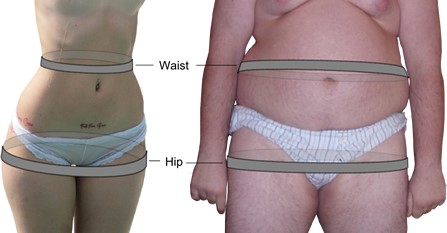Waist to Hip Ratio
Waist to hip ratio is increasingly being used by doctors in preference to Body Mass Index (BMI) as a better measurement of the risk of obesity and cardiovascular disease.
Good (below 0.80)
Generally if you have a ratio of 0.75 to 0.8 you are at low risk of weight-related disease but it is important to maintain your shape with a healthy diet and regular activity. The longer you can prevent central fat deposition, the longer and healthier your life will be.
Average (0.8 – 0.85)
You may feel you are healthy when you have a ratio of 0.8 to 0.85 but you already will have some fat deposited around the organs and in the membranes called the ‘omentum’ that line the abdominal cavity. This fat will have started to make the hormones and chemicals which increase your risk of disease.
High (0.85 – 0.9)
A high ratio of 0.85 to 0.9 shows that you have centrally stored fat and are at increased risk of disease compared to someone with no central fat. You may have no symptoms yet of diseases such as blood vessel inflammation and hardening which lead to stroke, high blood pressure or heart disease, or the hormonal affects such as infertility or pre-cancerous tissue change, but the unseen damage is already being done. It is important to stop that damage before it worsens – by the time you have symptoms, damage is already severe.
Extreme (0.9 and above)
With a very large abdominal girth compared to your hips you are extremely likely to be holding dangerous amounts of fat centrally, and so be at high risk of the all the diseases associated with this. In particular heart disease, high blood pressure and diabetes develop when the inflammatory effects of that mass of fat hit your blood vessels. Also, fat deposits in the liver, a condition called fatty liver, lead to the swelling and tenderness of Non-Alcoholic Steatohepatitis (NASH), and eventually a type of non-alcoholic cirrhosis. Generally men are more likely to get an overhanging ‘gut’ but women’s livers are actually more sensitive to damage from fat and also alcohol. Your lifespan will be shortened by several years unless you do something about your diet and lifestyle.

Female
| Age | Low | Moderate | High | Very High |
|---|---|---|---|---|
| 20-29 | < 0.71 | 0.71 – 0.77 | 0.78 – 0.82 | > 0.82 |
| 30-39 | < 0.72 | 0.72 – 0.78 | 0.79 – 0.84 | > 0.84 |
| 40-49 | < 0.73 | 0.73 – 0.79 | 0.80 – 0.87 | > 0.87 |
| 50-59 | < 0.74 | 0.74 – 0.81 | 0.82 – 0.88 | > 0.88 |
| 60+ | < 0.76 | 0.76 – 0.83 | 0.84 – 0.90 | > 0.99 |
Male
| Age | Low | Moderate | High | Very High |
|---|---|---|---|---|
| 20-29 | < 0.83 | 0.83 – 0.88 | 0.89 – 0.94 | > 0.94 |
| 30-39 | < 0.84 | 0.84 – 0.91 | 0.92 – 0.96 | > 0.96 |
| 40-49 | < 0.88 | 0.88 – 0.95 | 0.96 – 1.00 | > 1.00 |
| 50-59 | < 0.90 | 0.90 – 0.96 | 0.97 – 1.02 | > 1.02 |
| 60+ | < 0.91 | 0.91 – 0.98 | 0.99 – 1.03 | > 1.03 |
